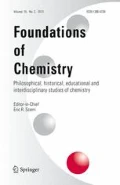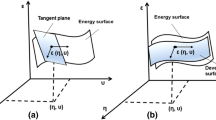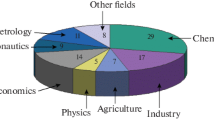Abstract
The problem of the peculiarcharacter of chemical laws and theories is a central topic in philosophy of chemistry. Oneof the most characteristic and, at the sametime, most puzzling examples in discussions onchemical laws and theories is Mendeleev'speriodic law. This law seems to be essentiallydifferent in its nature from the exact laws ofclassical physics, the latter being usuallyregarded as a paradigm of science byphilosophers. In this paper the main argumentsconcerning the peculiar character of chemicallaws and theories are examined. The laws ofchemistry are natural laws to the same extentas are the laws of physics. The law discoveredby Mendeleev is a normal law of nature. It isnot a law of physics, nevertheless, it is exactin the same philosophical sense as are the lawsof physics. The periodic system of chemicalelements was established by constructing anidealized system of idealized elements. Thefundamental idealization substantiated byexperimental chemistry was the chemicalelement as a place in the periodicsystem.
Similar content being viewed by others
REFERENCES
N. Bhushan and S. Rosenfeld (Eds.). Of Minds and Molecules: New Philosophical Perspectives on Chemistry. New York: Oxford University Press, 2000.
N. Cartwright. How the Laws of Physics Lie. Oxford: Clarendon Press, 1983.
M. Christie and J. Christie. “Laws” and “Theories” in Chemistry Do Not Obey the Rules. In N. Bhushan and S. Rosenfeld (Eds.), Of Minds and Molecules: New Philosophical Perspectives on Chemistry, pp. 34–50. New York: Oxford University Press, 2000.
R.N. Giere. Explaining Science: A Cognitive Approach. Chicago and London: The University of Chicago Press, 1988.
B.S. Gryaznov. Logic, Rationality, Creativity. Moscow: Nauka, 1982 [in Russian].
B.M. Kedrov. The Evolution of the Concept of Element in Chemistry. Moscow: RSFSR Academy of Pedagogical Sciences Press, 1956 [in Russian].
B.M. Kedrov. The Day of a Great Discovery. Moscow: Publishers of Social-Economic Literature, 1958 [in Russian].
B.M. Kedrov. A Philosophical Analysis of D.I. Mendeleev's Early Works on the Periodic Law. Moscow: USSR Academy of Sciences Press, 1959 [in Russian].
B.M. Kedrov. The Three Aspects of Atomism. III. Mendeleev's Law. The Logico-Historical Aspect. Moscow: Nauka, 1969 [This volume is a collection of papers first published in 1940–1953; in Russian].
J.H. Kultgen. Philosophic Conceptions in Mendeleev's Principles of Chemistry. Philosophy of Science 25(3): 177–183, 1958.
J. McAllister. Laws of Nature, Natural History, and the Description of the World. International Studies in the Philosophy of Science 11(3): 245–258, 1997.
D.I. Mendeleev. The Periodic Law. Compilation with an Article and Commentaries by B.M. Kedrov. Moscow: USSR Academy of Sciences Press, 1958 [a modern edition of the main articles and related matters on the Periodic Law by D.I. Mendeleev, in Russian].
F.A. Paneth. The Epistemological Status of the Chemical Concept of Element. The British Journal for the Philosophy of Science XIII:1–14, 144–160, 1962.
E.R. Scerri. Has Chemistry Been at Least Approximately Reduced to Quantum Mechanics? In D. Hull, M. Forbes and R. Burian (Eds.), PSA 1: 160–170, 1994.
E.R. Scerri. Realism, Reduction, and the “Intermediate Position”. In N. Bhushan and S. Rosenfeld (Eds.), Of Minds and Molecules: New Philosophical Perspectives on Chemistry, pp. 51–72. New York: Oxford University Press, 2000.
E.R. Scerri. The Failure of Reduction and How to Resist Disunity of the Sciences in the Context of Chemical Education. Science & Education 9: 405–425, 2000a.
E.R. Scerri and L. McIntyre. The Case for the Philosophy of Chemistry. Synthese 111: 213–232, 1997.
E.R. Scerri and J. Worrall. Prediction and the Periodic Table. Studies in History and Philosophy of Science 32: 407–452, 2001.
J. Schummer. Challenging Standard Distinctions between Science and Technology: The Case of Preparative Chemistry. Hyle 3: 90–91, 1997.
J. Schummer. The Chemical Core of Chemistry I: A Conceptual Approach. Hyle 4(2): 129–162, 1998.
S. Toulmin. The Philosophy of Science. An Introduction. London: Hutchinson, 1967.
J. van Brakel. On the Neglect of the Philosophy of Chemistry. Foundations of Chemistry 1: 111–174, 1999.
J. van Brakel. Philosophy of Chemistry: Between the Manifest and the Scientific Image. Leuven University Press, 2000.
R. Vihalemm. Can Chemistry be Handled as its Own Type of Science? In N. Psarros and K. Gavroglu (Eds.), Ars mutandi – Issues in Philosophy and History of Chemistry, pp. 83–88. Leipzig: Leipziger Universitätsverlag, 1999.
R. Vihalemm. Chemistry as an Interesting Subject for the Philosophy of Science. In R. Vihalemm (Ed.), Estonian Studies in the History and Philosophy of Science (Boston Studies in the Philosophy of Science. Vol. 219), pp. 185–200. Dordrecht: Kluwer, 2001.
Author information
Authors and Affiliations
Rights and permissions
About this article
Cite this article
Vihalemm, R. Are Laws of Nature and Scientific Theories Peculiar in Chemistry? Scrutinizing Mendeleev's Discovery. Foundations of Chemistry 5, 7–22 (2003). https://doi.org/10.1023/A:1021980526951
Issue Date:
DOI: https://doi.org/10.1023/A:1021980526951




